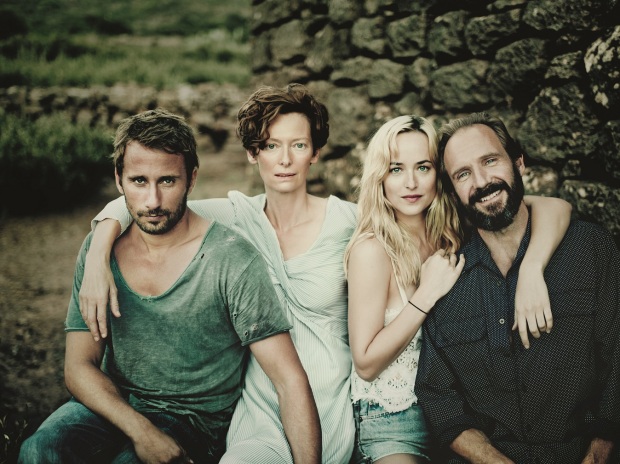In the Q+A after the London Film Festival screening of A Bigger Splash, director Luca Guadagnino said that to make a film about holidays that didn’t feature much nudity would be dishonest. To his credit, A Bigger Splash is a very naked film, but, more importantly, is also incredibly honest. A four-hander of simmering tensions, the entire lead quartet of actors imbue their characters with rich and real inner lives. It doesn’t hurt that two of these actors are the magisterial Ralph Fiennes and Tilda Swinton, giving top-drawer performances. Matthias Schoenarts and Dakota Johnson, two of the hottest properties in Hollywood at the moment, round out the four, and whilst they can’t match their more experienced co-stars, they’re still scorchingly good, and the entire four generates incredible chemistry.
We first meet Swinton and Schoenarts as they lounge by the pool of their gorgeous Sicilian island villa. Swinton’s Marianne is a Bowie-esque rockstar who’s lost her voice after throat surgery, whilst Schoenarts’ Paul is a documentarian. Marianne’s condition means that Swinton gets precious little to actually say over the course of the film, but she still does a phenomenal job of what is essentially silent movie acting and, when she does force some words out, you make damn sure you listen. Their life here is idyllic, all nude sunbathing and delicious food, disrupted only by the background news reports of desperate migrants and an oncoming storm. Combining both of these into one whirlwind of a human being is Harry Hawkes (Fiennes), arriving unannounced with his daughter (Johnson) and swiftly ensconcing himself into the villa.
Storm parallels are obvious every time Harry is on screen, and, much like the migrants, he’s leaving a place that frightens him for somewhere more pleasant and desirable. Except, instead of fleeing a war or seeking out new economic opportunities, he’s getting as far away as possible from a present that no longer finds him interesting into the romanticised past. He and Marianne (he was her producer/manager) were together for six years before she left him for Paul, and Harry vainly believes that he can regain the excitement and glamour of his old life. This backstory is fleshed out in a series of flashbacks, in which Marianne still has her full voice, which achieve the remarkable feat of making you want to see more, rather than interrupting the flow of the present story.
Fiennes is on the same spectacular form here that made four hours with him on stage such a joy in Simon Godwin’s wonderful version of Man and Superman. Whether he’s frantically monologuing about the glory days, sadly realising his own irrelevance, or dancing to the Rolling Stones, Fiennes is electric. It’s my favourite performance of the year, and it brings out the best in the rest of the cast. Belgian Schoenarts is completely convincing as an American film-maker, and Dakota Johnson proves she’s been woefully underutilised in her career thus far. As Harry’s estranged daughter Penelope, she brings a sense of haughty sadness to what could have been a thankless part.
As is to perhaps be expected of the star of Fifty Shades of Grey in a psychosexual drama, Johnson rarely wears much of anything at all, but Guadagnino’s use of nudity never feels gratuitous, perhaps in part to the rarely seen gender balance. For every second that Johnson has her kit off, there’s a second where Fiennes prances about with his willy out. Given the censors’ notorious dislike for these sorts of antics, it’s a bold move from Guadagnino, but not one that surprises in a film as confidently directed as this one.
Every car journey is followed at a respectable distance by a swooping camera, lending a kinetic feel that very few films in this genre achieve or even aim for. The first time Paul and Harry share a scene, it’s shot in Paul’s first-person view, with dark glasses giving his surroundings, most importantly the reunited Harry and Marianne, the look of an old photo. When Harry removes Paul’s glasses, bringing colour to the scene, it’s also a forceful reclamation of his old life from a younger rival. Subtler flourishes, such as the unobtrusive distortion effects whenever drugs are consumed, are no less effective.
David Kajganic’s screenplay, essentially a remake in plot terms and character names of 1969’s La Piscine, rarely puts a foot wrong. Conversations are at once familiar and cinematic, every exchange layered and suggestive. Of course, the calibre of the actors lifts the script, but this is excellent storytelling and dialogue. The last act is slower than all that’s come before, but this change of pace is structurally important and brings with it some near-perfect wrapping up of the themes that have been so ably explored in the main body of the film. Importantly, A Bigger Splash is also very funny. Fiennes carries over much of his gifted comic performance from Grand Budapest Hotel, although Harry is definitely more abrasive than the lovely Monsieur Gustave.
It’s not for nothing that A Bigger Splash is named after the Hockney painting of a the impact of a diver into a swimming pool. Every moment spent by the pool is a heady concoction of lust, jealousy, and barely-repressed resentment, and it takes on a very different connotation in each sequence. It’s luxurious, tempting, dangerous, or all these and more at the same time, and the exact same praise can be heaped onto the film as a whole. Gorgeous in every sense of the word, and highly unlike anything else I’ve seen recently. Characters with depth and real emotions, a sublime cast led by a manically brilliant Ralph Fiennes, and confident and involving direction, all buoyed by frequent laughs. You have to put some work in to catch all that makes A Bigger Splash such a pleasure, but you’re very richly rewarded for your efforts.
